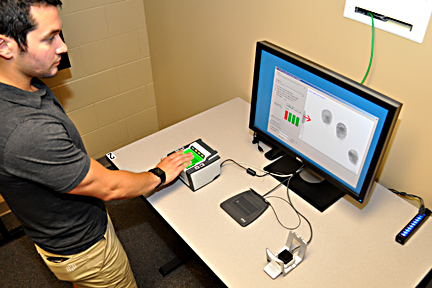
With a focus on real-world issues and global standards, Purdue University has created the International Center for Biometric Research (ICBR) within the College of Technology.
Led by Stephen Elliott, professor in the Department of Technology Leadership & Innovation, the center is an extension of his previous research lab, the Biometric Standards, Performance and Assurance lab. The change in status to a center is a reflection of the respect Elliott and his researchers garner within the industry, both in the United States and around the world. It also illustrates the growth and demand for biometric and identity management research.
Biometrics, in simple terms, is the automated recognition of individuals based on their behavioral and biological characteristics. In this field, Purdue focuses on four priorities. They engage industry on projects that involve testing and evaluation of technologies and protocols, develop global standards for the use of biometric technologies, develop innovative performance metrics, and apply their Human Biometric Sensor Interaction (HBSI) model to a variety of technologies.
"The last 10 years in biometrics technology have been about algorithm development,” Elliott said. “The next stage of evolution is predicting emerging opportunities, such as mobile frameworks and increased defense capabilities that take into account current geopolitical landscapes. The strength of applied learning and research in the college combined with a compelling curriculum in innovation and commercialization provides the foundation for the Center.” The center’s output is backed by academic publications, funded research and awarded patents.
 The ICBR already has partnerships with other centers on campus, including Center on Aging and the Life Course (CALC); Center for Education and Research in Information Assurance and Security (CERIAS); and the Cyber Center at Purdue University. Elliott and Kevin O’Connor, managing director of the ICBR, hope to strengthen the center’s partnerships with faculty within Purdue’s colleges of Science and Engineering and Krannert School of Management.
The ICBR already has partnerships with other centers on campus, including Center on Aging and the Life Course (CALC); Center for Education and Research in Information Assurance and Security (CERIAS); and the Cyber Center at Purdue University. Elliott and Kevin O’Connor, managing director of the ICBR, hope to strengthen the center’s partnerships with faculty within Purdue’s colleges of Science and Engineering and Krannert School of Management.
Student and faculty researchers with the center have been successful in influencing the national and international conversation surrounding biometrics and related technologies. An undergraduate researcher studied haptic feedback for fingerprint recognition, which resulted in a patent for the student. Graduate student research has focused on a variety of topics, including fingerprint recognition based on force levels and the role of test administrate and error. The most recent sponsored project, funded by U.S. National Strategy for Trusted Identities in Cyberspace (NSTIC), involves testing security protocols for a variety of mobile and tablet transactions.
The center will be open for tours in September during special events planned as part of the College of Technology’s 50th anniversary.
